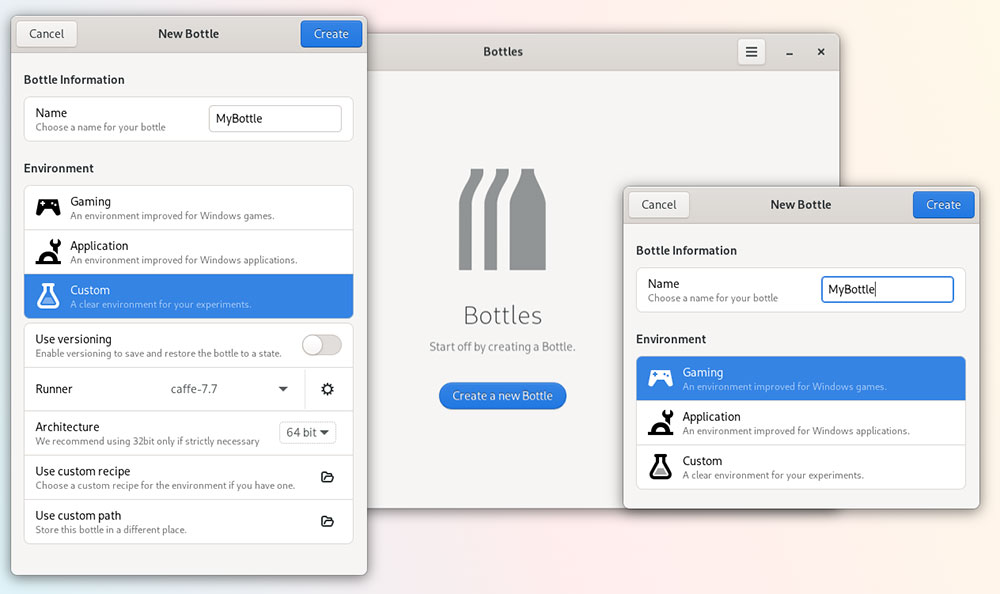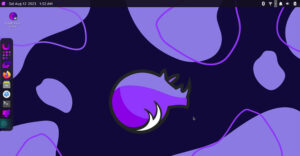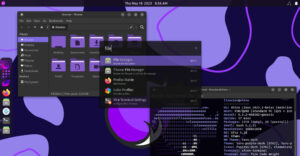Linux provides user options for a wide variety of desktop environments, making it a much richer computing platform compared to macOS and Microsoft Windows. That benefit is on display with this month’s distro releases and updates.
Check out a new option for integrating Windows gaming and business programs in whatever Linux variation you use. It gives “spin the bottle” a new endgame. Also find out what is new with Red Hat, Fedora, and a growing KDE clone.
Distro Releases To Try Out
If you are looking for a really cool Linux computing platform with lots of extras and a twist on traditional desktop design, check out Modicia OS Ultimate.
Italy-based Modicia Web Design and Development Company recently released its latest upgrade — Modicia O.S. 22.
You probably won’t stumble on this gem in hiding if you distro hop or browse through traditional outlets for Linux operating systems; but it is definitely a discovery worth finding. It is one of the easiest Linux offerings I have used.
Modicia Ultimate installs without hassles and has no learning curve to get started. It is a great platform for personal and small business use as well. Get it here.
The popular CentOS alternative, AlmaLinux, is now available on Oracle Cloud. AlmaLinux OS Foundation on May 5 announced its availability on the Oracle Cloud Infrastructure marketplace, continuing AlmaLinux’s penetration into the cloud.
With this addition to the Oracle Cloud Marketplace, enterprises can now add AlmaLinux into their virtual cloud network with the simple click of a button for both x86_64 and Aarch64.
“Oracle Cloud combines the elasticity and utility of public cloud with the granular control, security, and predictability of on-prem infrastructure. The tens of thousands of developers building with Oracle now have easy access to the open-source, community-owned and governed, forever-free enterprise AlmaLinux distribution and can get up and running immediately,” said Jack Aboutboul, community manager for AlmaLinux.
Got Nobara?
If you are a typical point-and-click Linux user looking for a new Fedora-based experience with gaming, content creation, and streaming easier in one place, check out the new Linux distro called Nobara Project. It is a modified version of Fedora Linux with user-friendly fixes built in.
This is not a spin of Fedora Linux. It is its own Fedora-based Linux distribution.
Nobara eliminates the usual Fedora struggles with getting things working beyond the basic browser and office documents that come with the OS, according to developer Thomas Crider’s website. These include some of the essentials missing from Fedora regarding gaming with Wine dependencies, obs-studio, third-party codec packages for gstreamer, Nvidia drivers, and small package fixes.
Speaking of Fedora Linux, the community-supported Fedora Project owned by Red Hat on May 7 released Fedora Linux 36. The default desktop is the GNOME environment. Other desktop environments include KDE, Xfce, LXDE, MATE, and Cinnamon.
The Fedora Project also distributes custom variations of Fedora called Fedora spins. These are built with specific sets of software packages, offering alternative desktop environments or targeting specific interests such as gaming, security, design, scientific computing, and robotics.
Unofficial Ubuntu Distros
April and May came with an assortment of new Ubuntu kindred releases. On the heels of the April 21 release of Jammy Jellyfish, Canonical’s next long-term support (five years) release of Ubuntu 22.04, two popular alternate flavors were released during the first week of May.
Ubuntu Unity is a remix of Ubuntu featuring its used-to-be default in-house desktop environment, Unity7, which Canonical abandoned after seven years in 2017 in favor of GNOME.
First released by the Ubuntu Unity community in May 2020, Ubuntu 22.04 hit the download servers early this month. This remix Linux distro, while based on the Ubuntu underbelly, is not affiliated with Ubuntu’s developer, Canonical.
A second alternative for pure Ubuntu also released this month is the latest edition of Ubuntu Cinnamon aka Cinnabuntu. This release is not officially supported by Canonical and is also dubbed version 22.04. Its developer is a Debian and Ubuntu software packager who leads the Ubuntu Cinnamon Remix project, Joshua Peisach, who goes by the online handle ItzSwirtz.
Full disclosure: Ubuntu Cinnamon has been my main Linux driver for the last few years, having displaced both Cinnamon desktop contenders Linux Mint and Feren OS. Desktop environments run the gamut of user preferences. In my case, the Ubuntu and Cinnamon combination provide usability options and stability not matched elsewhere.
KDE Fork Gaining Favor
Also made available this month was the latest release of an alternative desktop for KDE Plasma focusing on the strengths of the older KDE 3.5 version before the developer moved to KDE Plasma.
Trinity Desktop Environment is a Fork of KDE version 3.5 and a continuation of feature updates and bug fixes by a small development team.
TDE is a complete software desktop environment designed for computer users preferring a traditional desktop model. R14.0.12 is the twelfth maintenance release of the R14.0 series and it builds on and improves the previous maintenance versions.
TDE’s suitability list for compatible Linux distros is growing. You can easily find installation directions and packages for Debian, Devuan, Slackware, Raspbian, Arch, RedHat/CentOs, Fedora, Mageia, OpenSUSE, PCLinuxOS, and Ubuntu.
Linux Game Playing Unbottled
As great as the Linux OS platform is, generally it lacks native support for game playing without third-party solutions to run Windows games such as CrossOver, PlayonLinux, Lutris, and Wine.
Now, gamers can add one more solution to this list by installing Bottles, a free, open-source graphical application to manage Wine prefixes in a new way.
Bottles, while similar to PlayonLinux, Lutrix, and Winetricks, offers some enhancements that you might find to be better options. Use it to run all windows executables such as .bat, .exe, and .msi. The Bottles code automatically detects all installed apps — so you do not have to manually configure its list of applications.

Bottles is free and open source software that uses environments to help manage and run Windows apps on Linux.
You are not limited to a limited choice of ported games. You can use this new solution to run other Windows-based office and productivity programs, as well.
Bottles combine new environments with a collection of ready-to-use settings, libraries, and dependencies. The environments ensure support for multimedia applications for 3D modeling, video editing, and drawing programs as well as office and productivity software.
It will also install Arial, Times, and Courier fonts, and the Wine mono, replacing the .NET Framework.
RHEL 9 Released
Red Hat — on May 10 at its Red Hat Summit — announced the release of Red Hat Enterprise Linux 9, one of the industry’s leading enterprise Linux platforms.
Red Hat Enterprise Linux 9 is a platform for hybrid cloud innovation. It enables its partners to build and deploy any application across physical, virtual, private, and public cloud, and edge environments.
As the first production release built from CentOS Stream, RHEL 9 is based on direct input from partners, as well as customers and independent users. It forms the foundational backbone of the company’s open hybrid cloud portfolio to power critical production workloads spanning the full spectrum of cloud environments.
Red Hat now offers certification for edge systems on Red Hat Enterprise Linux. Through this certification, partners such as Dell Technologies, Hewlett Packard Enterprise, Lenovo, and OnLogic offer certified technology and expertise to support edge workloads running on Red Hat Enterprise Linux.
RHEL 9 is available through major cloud marketplaces.

























































Much appreciated, Mandrake. Thank you for your reader support. Best wishes, Jack
Jack M. Germain, who has always been an authoritative voice who gives space to the news of the open source world. Thanks for your great work.